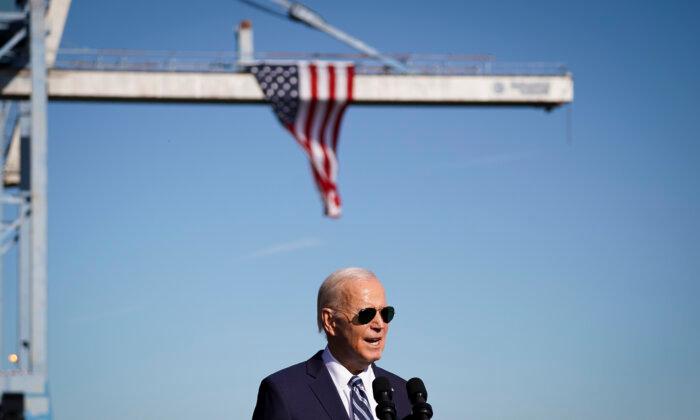The Biden administration set a major milestone in April, mandating more regulations in a single week than were enacted during both terms of the Obama administration, a new report says.
According to the April 22 “Week in Regulation” report released by the American Action Forum (AAF), a conservative think tank that monitors federal regulations, 20 new federal directives issued the previous week amounted to $875.3 billion in total costs and added 4.7 million annual paperwork burden hours, based on the agencies’ estimates.
Calling it “the biggest week on record” for federal mandates, the AAF stated that the report only accounted for the directives that had quantifiable costs and that more were handed down.
“This tailpipe rule pushed the Biden administration total into the trillions of dollars because that itself was in the hundreds of billions,” Dan Goldbeck, AAF’s director of regulatory policy and author of the study, told The Epoch Times.
Some economists see the Biden administration’s economic plan, dubbed “Bidenomics,” as an unprecedented expansion of government control over private industry, with a combination of heavy-handed regulation and massive state subsidies.
“President Biden has radically changed America’s economic template from one in which the core pillar the economy rested on was the free-enterprise private sector to one that rests on the state,” Steve H. Hanke, a professor of economics at Johns Hopkins University who served on President Reagan’s Council of Economic Advisers, told The Epoch Times. “Bidenomics is a form of state capitalism.”
While government industrial policy initiatives such as the CHIPS Act lavish billions on large corporations, including Intel ($8.5 billion), Taiwan Semiconductor Manufacturing Co. ($6.6 billion), Samsung ($6.4 billion), Micron ($6.1 billion), and Global Foundries ($1.5 billion), Mr. Hanke said, much of the private sector “has been buried under one new regulation after another, with many deemed necessary to meet climate goals and a variety of Environment, Social, and Governance (ESG) goals.”
“These will all prove to be very costly,” Mr. Hanke said.
As often occurs with regulations, the actual costs turn out to be much higher than official estimates.
Assessing the regulatory burden under the current and prior administrations, the AAF found that the cost of regulatory final rules issued by the Biden administration through April 26 of this year amounted to $1.47 trillion and 278.6 million paperwork hours.
By comparison, the cost of regulations issued under the Trump administration totaled $26.8 billion and 67.5 million paperwork hours; under eight years of the Obama administration, they totaled $303.4 billion and 236.5 million paperwork hours.
Political Motives
Mr. Yonk said the upcoming election was likely a factor in the recent issuance of so many new rules.“This push is not a surprise as the general electoral season has started, and the new wave of regulatory proposals are all consistent with campaign messaging that seeks to ensure progressive voters vote for the president’s reelection,” he said. “The reality of regulatory pushes driven by electoral considerations, regardless of what they are, is that they end up allowing politicians to claim the benefits and ignore the costs, costs that are paid by the consumer and taxpayer.”
According to the CRA, a simple majority of both the House and the Senate can issue a joint resolution of disapproval for any agency rule, in which case the rule cannot go into effect.
There is, however, a 60-day time limit on CRA resolutions, and with the Democrats holding a Senate majority, it is likely that most, if not all, of the Biden administration’s regulations will take effect.
Absent action from Congress, those who oppose administrative lawmaking have turned to the courts.
On March 15, the U.S. Court of Appeals for the Fifth Circuit temporarily blocked the SEC’s climate accounting rule.
The court challenge was brought by plaintiffs including the fossil fuel industry and 25 state attorneys general led by Iowa Attorney General Brenna Bird.
The plaintiffs argued, among other things, that the SEC’s edict was “arbitrary and capricious” and that it violated the “major questions doctrine,” according to which the Supreme Court ruled in cases such as West Virginia v. EPA that federal agencies cannot assume powers not explicitly granted to them by Congress, particularly on issues of major importance to Americans.
“The SEC’s job is to protect people from fraud; it has no business slapping companies with extremist climate mandates,” Ms. Bird said in an April 4 statement. “We are making it clear that Biden has to follow the law like everyone else.”
Former President Donald Trump was uniquely active during his administration in canceling and rolling back regulations passed by his predecessors.
“Under the Trump administration, you had a regulatory budget in place that, on the one hand, tried to put forward some deregulatory actions,” Mr. Goldbeck said, “but also mostly tried to constrain the overall magnitude of the rules that had been put out to begin with.”
President Trump reversed more than 100 environmental rules and took other actions to lift burdens on industry such as green-lighting the Keystone Pipeline, which President Biden immediately canceled upon taking office.






